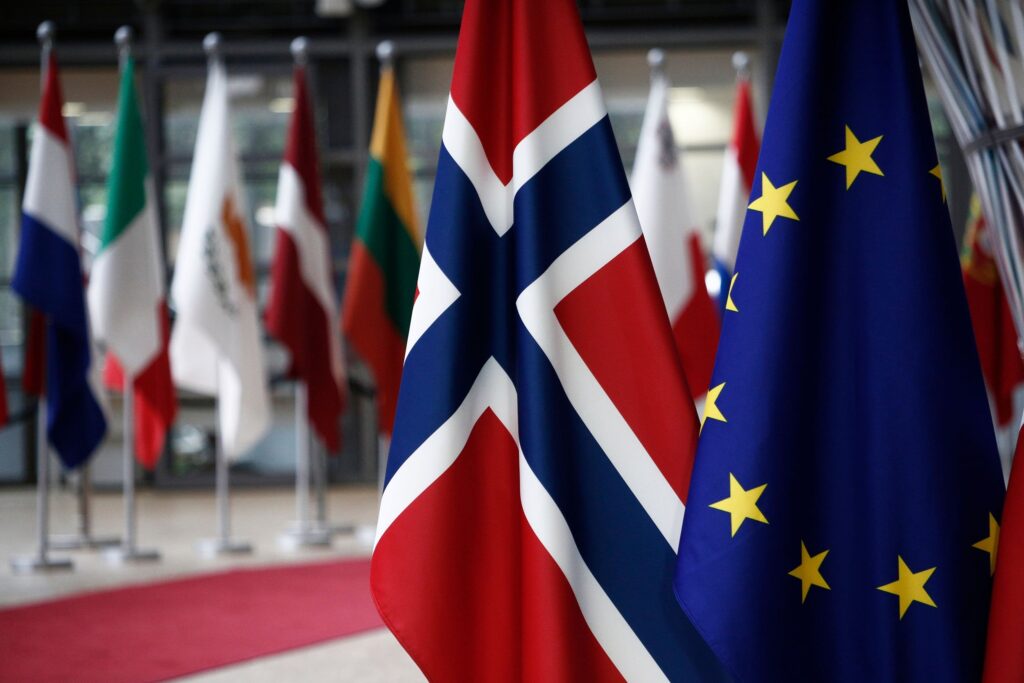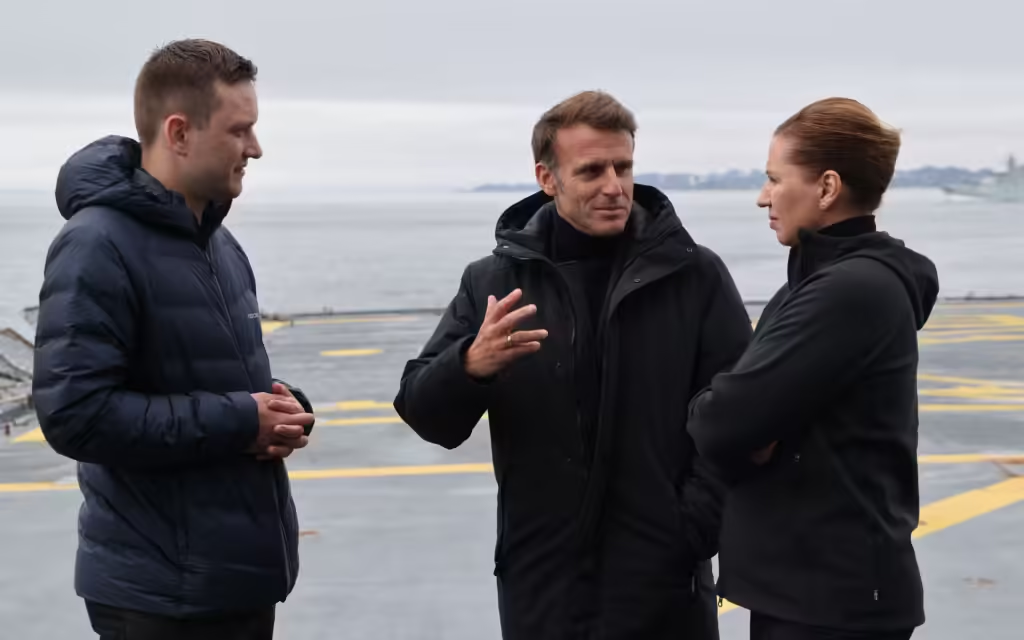Heading into Midsummer: A Geopolitical Overview from a Raven’s Eye View of Norden
By Jake Southerland
Norway Seeks Tighter Ties with EU Amidst Trump’s Tariffs: A Potential Lesson for the UK?
The origins of this historic relationship can be traced back to the 1960s, when Norway founded the European Free Trade Association (EFTA) as an alternative to the EU’s predecessor, the European Economic Community (EEC) since many saw EEC membership and its obligations as an overstep in national sovereignty. While many of EFTA’s founding members like the UK, Austria, and Denmark would eventually join the EEC, Norway did not, due to worries that EEC membership threatened national sovereignty and Norwegian culture; an argument that’s eerily similar for Brexit (Skinner 2012; Lee 2016), likely explaining why referendums on EU membership in 1972 and 1994 saw the “no” vote win in a slight majority (Fossum 2025). However, since the announcement of Trump’s tariffs, support for EU membership in Norway has significantly increased to approximately 41% after idling at 27% in 2023 (Haugstad 2025). While the current Norwegian government has ruled out a referendum, the Icelandic government’s planned 2027 EU membership vote could significantly influence Oslo in the coming years, especially after the collapse of Oslo’s current governing coalition in January (Southerland 2025).

With this new development in Norwegian-EU relations, what lessons could be provided for Britain? In Norway’s case, they are an EU member in all but name. Oslo aligns with EU regulation, trade and foreign policy, sanctions, and pays into its budget with EEA/EFTA membership (Jochevcová 2025). Britain has made numerous deals with the EU over the past few weeks which mirrors Norway’s current citation. British citizens can enter EU customs through e-gates at European airports; discussions for students to participate in the Erasmus+ program are ongoing, and an open border between Spain and Gibraltar has been established (Francis 2025; Morton 2025). The UK is acting like an EFTA member, which reflects a historical precedent. Naturally, Britain rejoining EFTA is unlikely, unless there’s a radical shift in the political landscape, but nevertheless, the tightening relations between the EU and its neighbors, the UK and Norway convey that there’s a spark in the air, once that could lead to a mass expansion of the EU.
Emmanuel Macron Performs Solidarity Visit to Greenland – Danish Territory on Trump’s Plate
Over the weekend, French President Emmanuel Macron visited Greenland alongside Danish Prime Minister Mette Frederiksen and her Greenlandic counterpart Jen-Frederik Nielsen. According to the Élysée Palace, the purpose of the visit was to “strengthen sovereignty and territorial integrity [of Greenland] due to certain comments made by Trump, which he conveyed that the US could take over the Danish territory by force if necessary” (Ataman 2025). During the visit, President Macron emphasized the importance of demonstrating French-Danish-EU unity ahead of the G7 Summit in Canada this week, stating that Trump’s actions are “not what allies do” (Henley 2025). In response to rising tensions, France has reportedly discussed sending troops to Greenland to reinforce the local Danish garrison. But where does the UK fit into this Danish-American standoff over Greenland?
As mentioned in my first post in this series, the UK continues to define itself as a “near-Arctic state” (UK Gov 2023), reflecting a growing interest in Arctic geopolitics. On the Greenland question, the UK has made its support for Copenhagen clear. The Prime Minister warned that an American attempt to seize Greenland would “embolden the likes of Vladimir Putin, who wants to see the West divided” (Devlin 2025). Throughout his premiership, the Prime Minister has hosted and visited several Danish officials, culminating in a number of defense agreements with Copenhagen. However, he has also made it clear that the UK will not serve as a “go-between” in the Greenland dispute (Wilcock and Tapsfield 2025). This firm support for Denmark—coupled with increasingly close UK-EU relations post-Brexit, signaling a major shift. A seismic change, in fact, in the nature of the US-UK “special relationship,” one that ironically began over a quarrel about tea and taxes 250 years ago (Wintour 2025). With Trump set to visit the UK in September, only time will tell how this new chapter unfolds. But it’s hard to deny that if Trump were to seriously pursue an invasion of Greenland, it could spell the end of NATO, presenting a golden opportunity for Russia to advance its interests, particularly in former Cold War territories, as Putin seeks to revive the legacy of Tsarist Russia. However, with Trump’s abrupt departure from the G7 summit in Canada one day early, could mean that the US is ready to support Israel in its ongoing confrontation with Iran, meaning that Greenland may be safe from America’s grasp momentarily.

Right now, UK-US relations are sailing through some rough waters. The Greenland dispute may seem distant, but it reveals deeper tensions about trust, sovereignty, and leadership among the Western allies. Still, Washington and Westminister’s partnership has stood strong through two world wars and countless geopolitical challenges. It has roots that go back well before World War I, and despite the bumps, it has always found a way to endure. The coming months will test how strong that bond truly is, but if history is any guide, it’s a relationship that is destined to remain steadfast.
Swedish PM Ulf Kristersson said Country Just Experienced a Cyberattack – Russia’s Doing?
According to Swedish PM Ulf Kristersson, the country experienced a cyberattack last week, specifically a Distributed Denial-of-Service (DDOS) attack on public broadcasters, financial institutions, and other critical aspects of the country’s digital landscape (Szumski 2025)For those unfamiliar with cyber warfare, a DDOS attack is a strategy of cyber warfare that intends to overload a website or server to the point where its performance is critically hampered or completely taken offline (UK National Cyber Security Centre 2016). While the perpetrator of last week’s attacks is unknown, the PM referred to Swedish intelligence reports that identified Russia, China, and Iran responsible for past attacks and haven’t necessarily ruled out the three states for this most recent operation. Given Sweden’s recent membership to NATO and its geographical significance in the Baltic and its proximity to Kaliningrad, Russia would not be a bad pick. More importantly, the cyber attack on Sweden could mean the UK could be next on Russia’s radar.
Russia’s history of hybrid warfare against the UK is extensive. The poisoning of Alexander Litvinenko in 2006 and the 2018 nerve agent attack on Sergei and Yulia Skripal in Salisbury showed Moscow’s willingness to use brutal and covert methods to silence dissidents and send clear messages of intimidation (Harding 2016; Lennon 2023). Alongside these physical attacks, Russia has launched numerous cyber operations targeting British institutions. The 2017 WannaCry ransomware attack crippled parts of the National Health Service and persistent intrusions have aimed at government networks, energy infrastructure, and critical services (BBC 2017). These actions reflect a broader strategy to undermine Western democracies and exploit vulnerabilities below the threshold of conventional war. As Sweden faces its recent cyberattack, likely part of this ongoing campaign of hybrid aggression, the UK must recognize it could be next in line.
Cyber warfare today is not a distant threat. It is a frontline in modern conflict where state and non-state actors seek to disrupt societies and weaken alliances without firing a single shot. The UK’s security depends on staying ahead of these threats by investing heavily in cyber defense initiatives, modernizing infrastructure, and building resilience across both public and private sectors. In this new era of warfare, pumping resources into cyber security is not just prudent but vital for protecting national sovereignty. In a future crisis between Russia and the West, if Moscow is able to utilize its infamous cyber warfare capabilities, it has the potential to cripple Europe at an unprecedented speed (Jones 2025) Most importantly, with Trump’s comments on European “free-loading”, it’s likely that the Americans might come to Europe’s aid in this doomsday scenario (Ross & et al. 2025).
